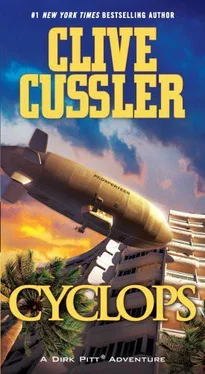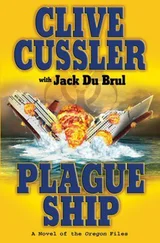The historic Horse and Artillery Inn was built in 1790 as a stagecoach stop and tavern for colonial travelers and sat amid sweeping lawns and a grove of shade trees. It was a picturesque three-story building with blue shutters and a stately front porch. The inn was an original example of early limestone farm architecture and bore a plaque designating it as listed on the National Register of Historic Places.
Hagen left the limousine, climbed the steps to the porch furnished with old-fashioned rockers, and passed into a lobby filled with antique furniture clustered around a cozy fireplace containing a crackling log. In the dining room he was shown to a table by a girl dressed in colonial costume.
"Is Dean around?" he asked casually.
"Yes, sir," answered the girl brightly, "The Senator is in the kitchen. Would you like to see him?"
"I'd be grateful if he could spare me a few minutes."
"Would you like to see a menu in the meantime?"
"Yes, please."
Hagen scanned the menu and found the list of early American dishes to be quite tempting. But his mind didn't really dwell on food. Was it possible, he thought, that Dean Beagle was Senator Dean Porter, who once chaired the powerful Foreign Relations Committee and narrowly lost a presidential primary race to George McGovern? A member of the Senate for nearly thirty years, Porter had left an indelible mark on American politics before he had retired two years ago.
A baldheaded man in his late seventies walked through a swinging door from the kitchen, wiping his hands on the lower edge of an apron. An unimpressive figure with a grandfatherly face. He stopped at Hagen's table and looked down without expression. "You wish to see me?"
Hagen came to his feet. "Senator Porter."
"Yes.
"My name is Ira Hagen. I'm a restaurateur myself, specializing in American dishes, but not nearly as creative as your recipes."
"Leo told me you might walk through my door," Porter said bluntly.
"Won't you please sit down."
"You staying for dinner, Mr. Hagen?"
"That was my plan."
"Then permit me to offer you a bottle of local wine on the house."
"Thank you."
Porter called over his waitress and gave the order. Then he turned back to Hagen and looked him solidly in the eye. "How many of us have you tagged?"
"You make six," Hagen answered.
"You're lucky you didn't go to Houston. Leo had a reception committee waiting for you."
"Were you a member of the `inner core' from the beginning, Senator?"
"I came on board in 1964 and helped set up the undercover financing."
"I compliment you on a first-rate job."
"You're working for the President, I take it."
"Correct."
"What does he intend to do with us?"
"Eventually hand out the honors you all so richly deserve. But his main concern is stopping your people on the moon from starting a war."
Porter paused when the waitress brought over a bottle of chilled white wine. He expertly pulled the cork and poured one glass. He took a large sip and swished the wine around in his mouth and nodded. "Quite good." Then he filled Hagen's glass.
"Fifteen years ago, Mr. Hagen, our government made a stupid mistake and gave away our space technology in a sucker play that was heralded as a `handshake in space'. If you remember, it was a much publicized joint venture between American and Russian space programs that called for our Apollo astronauts to team up and meet with the Soyuz cosmonauts in orbit. I was against it from the beginning, but the event occurred during the détente years and my voice was only a cry in the wilderness. I didn't trust the Russians then and I don't trust them now. Their whole space program was built on political propaganda and damned little technical achievement. We exposed the Russians to American technology that was twenty years ahead of theirs. After all this time Soviet space hardware is still crap next to anything we've created. We blew four hundred million dollars on a scientific giveaway. The fact we kissed the Russians' asses while they reamed ours only proves Barnum's moral about `one born every minute.' I made up my mind to never let it happen again. That's why I won't stand dumb and let the Russians steal the fruits of the Jersey Colony. If they were technically superior to us, there is no doubt in my mind they would bar us from the moon."
"So you agree with Leo that the first Russians to land on the moon must be eliminated."
"They'll do everything in their power to grab every scientific windfall from our moon base they can touch. Face reality, Mr. Hagen. You don't see our secret agents buying Russian high technology and smuggling it to the West. The Soviets have to rely on our progress because they're too stupid and nearsighted to create it on their own."
"You don't have a very high regard for the Russians," said Hagen.
"When the Kremlin decides to build a better world rather than divide and dictate to it, I might change my mind."
"Will you help me find Leo?"
"No," the senator said simply.
"The least the `inner core' can do is listen while the President pleads his case."
"Is that why he sent you?"
"He hoped I could find all of you while there is still time."
"Time for what?"
"In less than four days the first Soviet cosmonauts land on the moon. If your Jersey Colony people murder them their government might feel justified in shooting down a space shuttle or the space lab."
The senator looked at Hagen, his eyes turning to ice. "An interesting conjecture. I guess we'll just have to wait and see, won't we?"
<<33>>
Pitt used the catch from his watchband as a screwdriver to remove the screws holding the hinges to the wardrobe. He then slid the flat side of one hinge between the door latch and the strike. It was a near perfect fit. Now all he had to do was wait until the guard showed up with his dinner.
He yawned and lay on the bed, his thoughts turning to Raymond LeBaron. His image of the famous publisher-tycoon was chipped and cracked. LeBaron did not measure up to his hard reputation. He gave the appearance of a man who was running scared. Not once did he quote Jessie, Al, or Rudi. Surely they would have relayed a message of encouragement. There was something very fishy about LeBaron's actions.
He sat up at the sound of the door latch turning. The guard entered, holding a tray in one hand. He held it out to Pitt, who set it on his lap.
"What gourmet delight have you brought this evening?" Pitt inquired cheerfully.
The guard gave a distasteful twist of his lips and shrugged indifferently. Pitt couldn't blame him. The tray held a small loaf of doughy, tasteless bread and a bowl of god-awful chicken stew.
Pitt was hungry, but more important he needed to keep his strength. He forced the slop down, somehow managing to keep from gagging. Finally he passed the tray back to the guard, who silently took it and then pulled the door closed as he stepped into the corridor.
Pitt leaped from the bed, dropped to his knees, and slipped one of the wardrobe hinges between the latch and the doorjamb, preventing the bolt from passing through the strike into the catch. In almost the same motion he pressed his shoulder against the door and tapped the second hinge on it to imitate the click of the latch snapping into place.
As soon as he heard the guard's footsteps fade down the corridor he eased open the door slightly, peeled a piece of tape from a bandage covering a cut on his arm, and stuck it over the latch shaft so the door would remain unlocked.
Removing his sandals and stuffing them into his waistband, he eased the door closed, taped a hair across the crack, and soundlessly padded down the empty corridor, pressing his body close against the wall. There was no sign of any guards or security equipment.
Читать дальше












